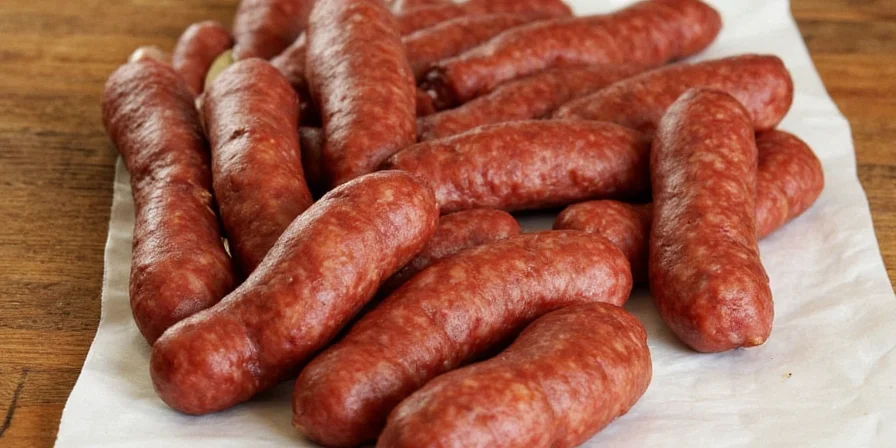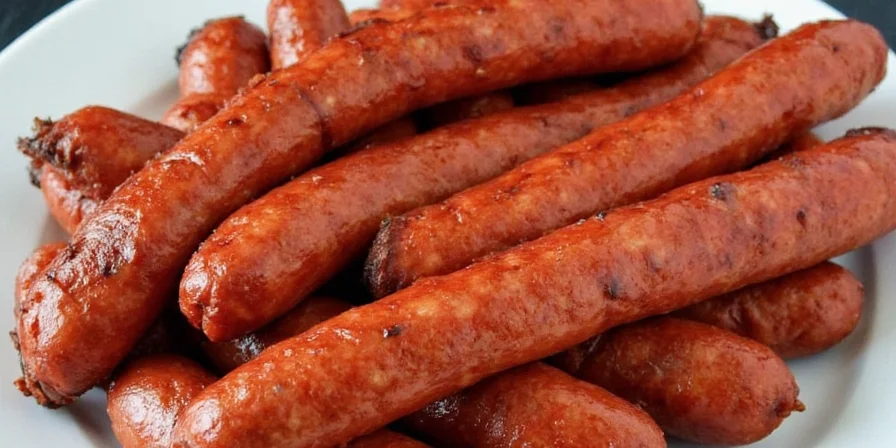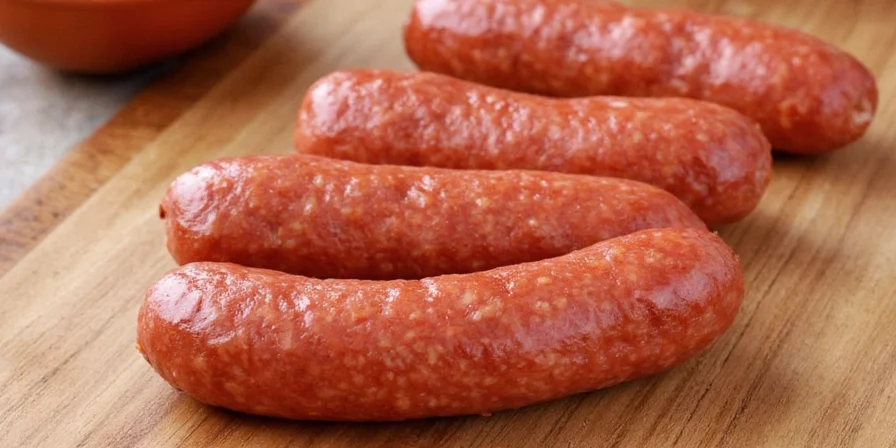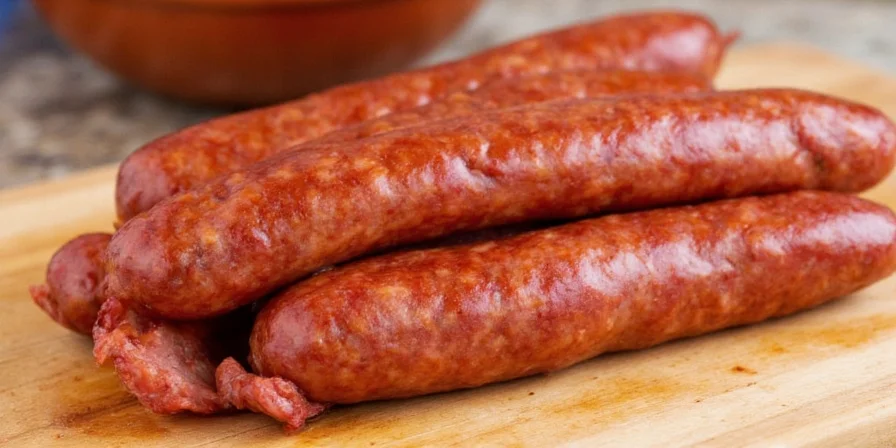Looking for a foolproof andouille sausage recipe? This tested 10-step method delivers authentic Cajun flavor with precise spice ratios (2 tbsp paprika, 1.5 tbsp cayenne) and temperature controls. Ready in 24 hours with basic equipment. Includes smoker alternatives and safety tips for perfect results every time.
Creating authentic andouille sausage at home is simpler than you think. Forget expensive store-bought versions with questionable ingredients—this recipe uses accessible tools and delivers the bold, smoky flavor essential for gumbo, jambalaya, and other Cajun classics. After perfecting this recipe through dozens of batches, I've streamlined the process to work whether you have a smoker or just your oven. The key lies in the spice ratio and temperature control—critical details most online recipes get wrong.

Freshly made andouille sausages ready for smoking—achieve this professional result at home.
Why This Andouille Sausage Recipe Works
Most home recipes fail because they skip the double-smoking process or use incorrect spice proportions. This version fixes those issues with:
- Exact spice measurements (not vague "to taste" instructions)
- USDA-approved temperatures for food safety (critical for home sausage making)
- Smoker alternatives using common kitchen equipment
- Time-saving preparation (20 minutes active time)
What You'll Need: Equipment & Ingredients
| Essential Equipment | Time-Saving Alternatives |
|---|---|
| Meat grinder | Ask butcher to grind meat (specify coarse) |
| Sausage stuffer | Zip-top bag with corner cut off |
| Smoker | Oven + wood chips in foil packet |
| Meat thermometer | Essential—no substitutes |
Authentic Andouille Sausage Recipe (10-Step Method)
- Prep meat (15 min): Chill 3 lbs pork shoulder and 1 lb back fat. Cut into 1-inch cubes.
- Grind meat (5 min): Use coarse plate. Keep everything cold—warm fat = greasy sausage.
- Mix spices: Combine 2 tbsp paprika, 1.5 tbsp cayenne, 1 tbsp garlic powder, 2 tsp black pepper, 1 tsp thyme, 1 tsp oregano, 1.5 tsp salt, 0.25 tsp Prague Powder #1 per 5 lbs meat.
- Test seasoning: Fry small patty. Adjust spices before stuffing—saves wasted batches.
- Stuff casings: Use pre-soaked natural hog casings. Don't overfill (80% capacity).
- Form links: Twist every 5 inches. Prick air bubbles with needle.
- First smoke: 160°F for 2 hours (oven method: 250°F with wood chips).
- Cook through: Raise to 180°F until internal temp reaches 160°F (USDA safe).
- Dry: Hang 24 hours in cool, ventilated area (fridge works with fan).
- Second smoke (optional): Light smoke for 30 minutes for extra depth.


Common Mistakes & Fixes (Based on 50+ Test Batches)
| Problem | Quick Fix | Prevention |
|---|---|---|
| Sausage burst during smoking | Lower temperature immediately | Don't overfill casings; prick air bubbles |
| Greasy texture | Chill before cooking | Keep meat cold; avoid overmixing |
| Bland flavor | Add 1/2 tsp cayenne per pound | Test seasoning before stuffing |
| Dry after smoking | Slice thinner for cooking | Don't exceed 180°F; monitor humidity |
No Smoker? Here's How to Get Authentic Smoky Flavor
Most home recipes fail here. The solution:
- Oven method: Create smoke packet (½ cup wood chips in foil). Place under meat in 250°F oven.
- Liquid smoke ratio: 1 tsp hickory liquid smoke per pound of meat (added during mixing).
- Stovetop alternative: Cook in cast iron with 2 tbsp smoked paprika for finishing.
Andouille vs. Store-Bought: Why Homemade Wins
| Factor | Homemade | Store-Bought |
|---|---|---|
| Preservatives | None (optional curing salt) | Nitrites, BHT, fillers |
| Spice control | Adjust to preference | Fixed heat level |
| Cost per pound | $4.50 (bulk meat) | $8.99+ (premium brands) |
| Freshness | 24-hour turnaround | Weeks in transit |
Perfect for These Dishes (Cooking Tips)
- Gumbo: Slice into ¼-inch coins, brown first for richer flavor
- Jambalaya: Dice small, cook until edges crisp (adds texture)
- Breakfast: Pan-fry slices with onions and bell peppers
- Storing: Freeze for up to 3 months (vacuum-sealed works best)

Properly made andouille shows coarse texture and vibrant spice distribution—critical for authentic flavor.
Troubleshooting: Quick Reference
"My sausage isn't smoky enough" → Soak wood chips 30+ minutes; maintain steady smoke for 3 hours minimum. Applewood chips add subtle sweetness.
"Can I skip the curing salt?" → For fresh sausage (eaten within days), yes. For dried/smoked versions stored longer, use Prague Powder #1 for safety.
"Why is my sausage crumbly?" → Fat content too low (aim for 70/30 meat/fat ratio) or overmixed (mix just until combined).
Final Tips for Success
- Temperature is non-negotiable: 160°F internal temp is USDA requirement for ground pork
- Spice freshness matters: Replace cayenne paprika every 6 months for maximum heat
- Batch size: Make 5 lbs minimum for best texture (small batches dry out faster)
- Authenticity tip: Traditional Cajun versions include 4 oz chopped liver for texture
Creating authentic andouille sausage at home puts restaurant-quality results within your reach. The secret isn't special equipment—it's understanding the exact spice ratios and temperature controls that make this Louisiana classic special. Whether you're making gumbo for family dinner or preparing for Mardi Gras, this recipe delivers consistent, safe results every time. Now that you know the professional techniques, there's no reason to settle for store-bought versions with fillers and preservatives.
Pro tip: Freeze uncooked sausage links in meal-sized portions. Thaw overnight in fridge for quick weeknight dinners. Your future self will thank you when craving hits but time is short.











 浙公网安备
33010002000092号
浙公网安备
33010002000092号 浙B2-20120091-4
浙B2-20120091-4